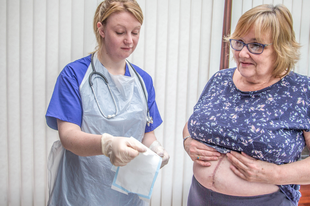Ovarian Cancer Action's Vision for the Future: Our NHS 10-Year Plan Submission
This Autumn the Government launched Change NHS, a tool to collect ideas from individuals and organisations from all over the country to shape a new 10 Year Health Plan for England. Ovarian Cancer Action submitted our vision and ideas to transform survival rates for women with ovarian cancer over the next decade.
The urgent need for action
We highlighted the stark reality of ovarian cancer in the UK:
- Only 1 in 3 women survive beyond 10 years after diagnosis.
- 95% of women could survive if diagnosed at stage one, yet only 29% receive this early diagnosis.
- 90% of people are unaware of the symptoms of ovarian cancer
- 11% of cases of ovarian cancer are preventable.
What do we want to see from the NHS 10 year plan?
We outlined several key areas for the NHS to prioritise over the next decade:
A national cancer plan:
This plan should include ambitious goals for reducing late-stage diagnoses and improving survival rates, particularly for cancers like ovarian cancer, striving to achieve world-class standards.
Prioritising early diagnosis and prevention:
Early diagnosis and prevention are critical for both cost reduction and saving lives.
Addressing health inequalities:
The plan should focus on reducing regional variations in outcomes and ensuring that all patients, regardless of their location, age, ethnicity, or socio-economic status, benefit equally from NHS advancements.
Revolutionising clinical trials:
Ovarian Cancer Action calls for a new era of clinical trial innovation and partnership with industry, ensuring that every patient is considered for a trial.

All patients, regardless of their location, age, ethnicity, or socio-economic status, should benefit equally from NHS advancements.
How can ovarian cancer patients benefit from ‘Three Shifts’
The Government is focussing on three main shifts for the 10 year NHS Plan:
- From hospital to community
- From analogue to digital
- From sickness to prevention
We outlined the changes we want to see in each of those shifts for women with ovarian cancer.
From hospital to community:
- Centralisation of specialised treatments for less common diseases like ovarian cancer – in particular surgery. Centralisation will ensure patients receive the best possible care, even if it requires them to travel.
- Simultaneously, non-specialised treatments, such as prehabilitation, chemotherapy, and scans, should be delivered within the community, minimising travel burdens for patients.
- Clinical trials must also be decentralised to improve accessibility, particularly for rare diseases where patient recruitment can be challenging. The Cancer Vaccine Launch Pad provides an excellent model for decentralised trials.
From analogue to digital:
- AI tools offer opportunities for improving pathways, freeing up healthcare professionals' time for patient care and facilitating earlier diagnoses, particularly in primary care, which could alleviate pressure on A&E services.
- Digital and virtual training tools can revolutionise the NHS workforce by providing flexible, accessible, and cost-effective learning opportunities, reducing regional variations in treatment and outcomes.
- Expanding the use of virtual multidisciplinary teams (MDTs) can connect specialists across regions, ensuring equitable access to expert advice and standardised care for complex cases.
- Unlock the potential of NHS patient data for transforming care and research.
From sickness to prevention:
- We must harness the potential of genomics in identifying individuals with an inherited risk of diseases like cancer (e.g., BRCA gene mutations and Lynch syndrome). Enabling access to risk-reducing interventions for these individuals could prevent thousands of cancer cases annually.
- Clinical trial design must be flexible and adaptive to accelerate the translation of new prevention discoveries into real-world benefits. The success of the COVID-19 vaccine rollout demonstrates the potential of this approach.

We must harness the potential of genomics in identifying individuals with an inherited risk of diseases like cancer.
Specific Policy Recommendations
We have called on the Government to include these specific policies in the NHS 10 year plan.
Short-term:
- Commission a review of AI opportunities across all cancer types, prioritising areas with the longest waiting times and partnering with charities and academics for comprehensive coverage.
- Introduce a pilot scheme to use existing healthcare interactions, like cervical and breast screening appointments, as opportunities to educate the public on other women’s health symptoms.
- Establish survival rate targets for cancer types, including ovarian cancer, aligned with international benchmarking.
Medium-term (2-5 years):
- Create a world-beating partnership with industry to fund the expansion of clinical trial portfolios, ensuring all cancer patients are offered a trial opportunity.
- Rollout AI tools in primary care settings to speed up early diagnosis and prevention.
Long-term (5+ years):
- Implementing whole-population BRCA testing if its cost-effectiveness for the NHS is proven.
Our submission to the NHS 10-Year Plan provides a roadmap for transforming survival rates in ovarian cancer over the next decade. By prioritising early detection, prevention, research, and equitable access to care, the NHS can make significant strides towards not just improving outcomes for women with ovarian cancer, but also women's health overall.
Our submission to the NHS 10-Year Plan provides a roadmap for transforming survival rates in ovarian cancer over the next decade.
By prioritising early detection, prevention, research, and equitable access to care, the NHS can make significant strides towards not just improving outcomes for women with ovarian cancer, but also women's health overall.
Do you have an idea for a specific policy recommendation that we haven’t included in our 10-year plan submission? Let us know on info@ovarian.org.uk